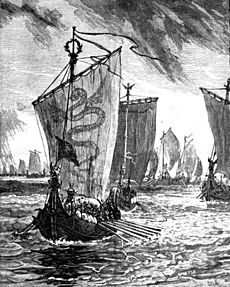Gebeachan facts for kids

Gebeachan (died 937), also known as Gébennach or Gebechán, was a king who lived in the tenth century. He ruled over the Kingdom of the Isles, which was a group of islands off the coast of Scotland. Gebeachan was likely an ally or helper of Amlaíb mac Gofraid, who was the King of Dublin. We know that Gebeachan fought and died in a very important battle called the Battle of Brunanburh in the year 937.
Contents
The Battle of Brunanburh
Gebeachan died in 937 during the Battle of Brunanburh. This was a very fierce and important battle. On one side was Æðelstan, who was the King of the English. On the other side were several kings who had joined forces. These included Amlaíb mac Gofraid, the King of Dublin; Custantín mac Áeda, the King of Alba (an old name for Scotland); and Owain ap Dyfnwal, the King of Strathclyde.
A very old poem, found in the Anglo-Saxon Chronicle, tells us that Æðelstan's enemies lost many people in this battle. It says that five kings, seven earls, and many warriors from the "raiding-army of Seamen and Scots" were killed.
Gebeachan's Role in the Battle
We know that Gebeachan died in this battle from just one old record. This record is a translation from the 1600s of a book called the Annals of Clonmacnoise. The original book is now lost. The person who translated it, Conall Mac Eochagáin, sometimes added his own thoughts. So, it's hard to know exactly what was in the original book.
However, this old record calls Gebeachan "king of the Islands." This title is like the Gaelic phrase rí Innse Gall, which means "King of the Isles." This title was first used in records around 989.
What Gebeachan's Name Means
The name "Gebeachan" probably comes from a Gaelic word. It might be related to "Gebechán," "Giblechán," or "Gébennach." These names appear in other old Irish writings.
Another idea is that his name comes from "gebech," which means a type of craftsman. Or, it could be a nickname related to "fetters" or "bondages." Because his name is clearly Gaelic, historians think Gebeachan was probably not from Orkney. He was more likely from the southern Hebrides, which are islands off the west coast of Scotland.
Gebeachan's Connections
Historians believe that Gebeachan might have been an ally of Amlaíb mac Gofraid. Amlaíb was called "king of the Irish and the many islands" in another old book, the Chronicon ex chronicis. If Gebeachan was Amlaíb's ally, then Gebeachan's death shows that Amlaíb's family (called the Uí Ímair) had power in the Isles during the 930s and 940s.
The old book Chronicon ex chronicis also mentions that five "reguli" (which means minor kings) died helping Amlaíb at Brunanburh. Gebeachan's title suggests he was one of these kings.
After Amlaíb's Death
Amlaíb himself died in 941. After his death, another old book, the Chronicon Scotorum, says that Muirchertach mac Néill, the King of Ailech, raided "the Isles of Alba" (Scotland). This probably means the southern Hebrides. This event might show that enemies of Amlaíb's family took advantage of his death to gain power.
Also in 941, the Annals of the Four Masters reports that a leader named Áed Albanach was killed. He died with many Vikings from Dublin, fighting against forces led by Amargein mac Cináeda. Áed had a Gaelic name and an epithet (a descriptive nickname) that meant "Scotsman." This might suggest he was a leader who came after Gebeachan.
Another old story, Caithréim Chellacháin Chaisil, mentions a woman named Mór. She was the daughter of a King of the Hebrides named Áed mac Echach. This could be more evidence of leaders connected to Gebeachan's time and region.
 | Precious Adams |
 | Lauren Anderson |
 | Janet Collins |

